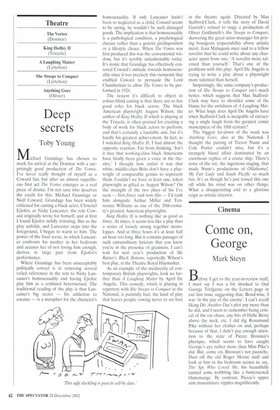Deep secrets
Toby Young
Michael Grandage has chosen to mark his arrival at the Donmar with a surprisingly good production of The Vortex. I've never really thought of myself as a Coward fan, but after an almost superfluous first act The Vortex emerges as a real piece of drama. I'm not sure who deserves the credit for this: Michael Grandage or Noel Coward. Grandage has been widely criticised for casting a black actor, Chiwetel Ejiofor, as Nicky Lancaster, the role Coward originally wrote for himself, and at first I found Ejiofor mildly irritating. But as the play unfolds, and Lancaster steps into the foreground, I began to warm to him. The power of the final scene, in which Lancaster confronts his mother in her bedroom and accuses her of not loving him enough, derives in large part from Ejiofor's performance.
Where Grandage has been unacceptably politically correct is in removing several veiled references in the text to Nicky Lancaster's homosexuality and having Ejiofor play him as a confused heterosexual. The traditional reading of the play is that Lancaster's big secret — his addiction to cocaine — is a metaphor for the character's homosexuality. If only Lancaster hadn't been so neglected as a child, Coward seems to he saying, he wouldn't be such damaged goods. The implication is that homosexuality is a pathological condition, a psychological disease rather than a genetic predisposition or a lifestyle choice. When The Vortex was first produced this was the conventional wisdom, but it's terribly unfashionable today. It's ironic that Grandage has effectively censored Coward's attitude towards homosexuality since it was precisely this viewpoint that enabled Coward to persuade the Lord Chamberlain to allow The Vortex to be performed in 1924.
The reason it's difficult to object to colour-blind casting is that there are so few good roles for black actors. The black American playwright August Wilson, the author of King Hedley II which is playing at the Tricycle, is often praised for creating a body of work for black actors to perform, and that's certainly a laudable aim, but it's hardly his greatest achievement. In fact, as I watched King Hedley ii, I had almost the opposite reaction. Far from thinking, 'Isn't it nice that working-class black Americans have finally been given a voice in the theatre.' I thought how unfair it was that white, middle-class Brits don't have a playwright of comparable genius to represent them. Couldn't we have at least one, token playwright as gifted as August Wilson? On the strength of the two plays of his I've
seen first Jitney and now this — I'd rank him alongside Arthur Miller and Tennessee Williams as one of the 20th-century's greatest American playwrights.
King Hedley II is nothing like as good as Jitney. At times, it seems less like a play than a series of loosely strung together monologues. And at three hours it's at least half an hour too long. But it contains passages of such extraordinary lyricism that you know you're in the presence of greatness. I can't wait for next year's production of Ma Raincy's Black Bottom, reportedly Wilson's best play, at the Theatre Royal Haymarket.
As an example of the mediocrity of contemporary British playwrights, look no further than A Laughing Matter by April De Angelis. This comedy, which is playing in repertory with She Stoops to Conquer at the National. is painfully bad, the kind of play that leaves people vowing never to set foot
in the theatre again. Directed by Max Stafford-Clark, it tells the story of David Garrick's refusal to stage a production of Oliver Goldsmith's She Stoops to Conquer, skewering the great actor-manager for prizing bourgeois respectability above artistic merit. Jean Malaquais once said to a fellow novelist that he could write about any character apart from one: 'A novelist more talented than yourself.' That's one of the problems with this play: April De Angelis is trying to write a play about a playwright more talented than herself.
Surprisingly, the same company's production of She Stoops to Conquer isn't much better, which suggests that Max StaffordClark may have to shoulder some of the blame for the awfulness of A Laughing Matter. What hope does April De Angelis have when Stafford-Clark is incapable of extracting a single laugh from the greatest comic masterpiece of the 18th century?
The biggest let-down of the week was Anything Goes, also at the National. I thought the pairing of Trevor Nunn and Cole Porter couldn't miss, but it's a strangely bland affair dominated by an enormous replica of a cruise ship. There's none of the wit, the ingenious staging, that made Nunn's productions of Oklahoma!, My Fair Lady and South Pacific so much fun. It's as though he's just tossed this one off while his mind was on other things. What a disappointing end to a glorious reign as artistic director.


























































 Previous page
Previous page